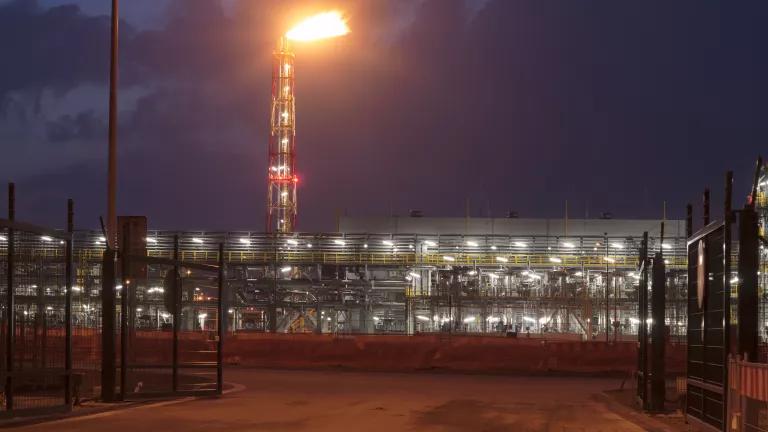America Should Export Clean Energy, Not Climate Chaos
As Congress revisits America’s foreign development strategies, it should prioritize clean energy solutions both at home and abroad to chart a more sustainable path forward and provide other countries with a truly clean energy financing alternative to Russia and China.
No matter how fast we reduce domestic greenhouse gas emissions, the amount of fossil fuels the United States is projected to export in the coming decades will blow everything out of the water in terms of future US emissions growth, keeping the world on a course of climate chaos. While President Trump dismisses as a “dream” any hopes of addressing climate change, Congress will have a crucial role to play on this energy export issue in the coming weeks.
President Trump and his administration have been pushing a dangerous "Freedom Gas” narrative, alleging that exporting US natural gas will simultaneously solve our foreign policy and environmental concerns. But given the urgency of addressing the global climate crisis, this narrative will have disastrous consequences. As a recent NRDC blog explains, US natural gas isn’t a climate solution. Rather, it locks in more climate and environmental problems for decades to come. We must push a cleaner alternative to “Freedom Gas.”
Fortunately, America is a global leader in clean energy innovation, developing cutting edge designs and technologies for the next generation of solar panels, wind turbines, battery storage, efficient appliances, and electric vehicles. Yet the American commitment to clean energy must increase to achieve the low-carbon, high-tech energy transformation the world desperately and urgently needs to save our planet from the worst impacts of climate change. To start, we can do better at manufacturing and exporting clean energy through our investments and actions abroad.
As Congress revisits America’s foreign development strategies, it should steer away from Trump’s misguided approach that will promote dirty energy and more greenhouse gas emissions. Congress should instead prioritize clean energy solutions both at home and abroad to chart a more sustainable path forward and provide other countries with a truly clean energy financing alternative to Russia and China.
First, if Congress reauthorizes the Export-Import Bank of the United States (EXIM), it should be turned into a clean energy export machine. The House version of the bill proposes creating an Office of Financing for Renewable Energy, Energy Efficiency, and Energy Storage Exports. It also requires EXIM to devote 5 percent of its total financing to renewable energy deployment. This is a step in the right direction, but still a weak start, considering the scale of urgent action needed to address the climate crisis. Instead of a partial nod to clean energy, Congress should direct all of EXIM’s massive financing power on the energy front towards clean energy (see this NRDC blog to learn more), rather than trying to finance more fossil fuels.
Second, Congress should remove an appropriations rider that weakens the environmental rules of the new U.S. International Development Finance Corporation (USDFC), formerly the Overseas Private Investment Corporation (OPIC). Last year Congress passed the BUILD Act, doubling OPIC’s funding and renaming it, but it has yet to remove the appropriations rider that weakened restrictions on dirty energy investments. The USDFC will be set up by October 1, 2019. See this NRDC blog to learn more.
Third, Congress should help Europe and the rest of the world build a reliable, efficient and renewable clean energy system. Instead of fighting gas with gas, the United States could be helping other countries reduce energy demand through energy efficiency, deploy renewables, and modernize their grids. This approach would reduce carbon emissions to help save our planet from climate change, create healthier communities, and promote cleaner air—providing a true alternative to locking poor countries into unsustainable projects.
The United States has an abundance of natural gas due to fracking, which damages local communities and contributes to climate change. This has led to the United States becoming a major global supplier of climate-warming fossil fuels with severe negative consequences, not only domestically for local communities that are the sacrifice zones for fracking and pipelines, but for other countries that are trying to reduce emissions and become less reliant on fossil fuels. The “Freedom Gas” narrative will only perpetuate over-reliance on dirty energy infrastructure and products both domestically and overseas.
Although natural gas helped the country begin its transition away from coal and petroleum, it is not a clean fuel. The extraction and combustion of natural gas poses a myriad of problems for clean air, clean water, wildlife, landscapes and ecosystems, human health, local communities, and our climate. Leaking natural gas infrastructure is a source of unaccounted climate and toxic air emissions which creates emissions hotspots, negative human health impacts, and environmental justice issues.
Just as America is turning to clean energy to protect our communities, wildlands, and climate, we should be promoting the same transition abroad and not be subsidizing gas infrastructure.
Several states are actively fighting against overreliance on natural gas. State regulators are rejecting and questioning utilities’ continued rush to gas that has already resulted in a massive, dirty, and overly costly buildout of natural gas in recent years.
In Arizona, Republican utility regulators took the unprecedented step of rejecting the long-term plans of two electric utilities due to their significant new gas builds and placed a nine-month moratorium on new plants. Minnesota regulators also rejected new gas plants, calling on the utilities to explore clean alternatives like renewables, energy efficiency, demand response, and storage instead. And in California, that state’s utilities and regulators are building a significant amount of energy storage to replace the need for reliability-required contracts with costly gas plants and to help move the state off natural gas storage systems, which have experienced catastrophic and high-profile leaks in the last few years.
As more power systems in the US turn away from gas, the answer isn’t to export surplus internationally—that would just be exporting the climate problem while keeping the upstream damages in communities who have suffered enough. The primary beneficiaries of dumping more fossil fuels into energy markets overseas are the oil and gas industry and friends of the current administration, not the rest of America. American taxpayer money should be used to help other countries reduce their dependence on all fossil fuels, not lock in dirty, climate-warming infrastructure for decades to come.
We should be exporting and providing financing for clean, efficient, cheaper, and sustainable alternatives to fossil fuels, offering US innovations in technologies, services, and products, and leading by example by transitioning to a clean energy economy at home. Instead of playing into Trump’s “Freedom Gas” narrative, we urge Congress to push a better one: Freedom from Gas.





